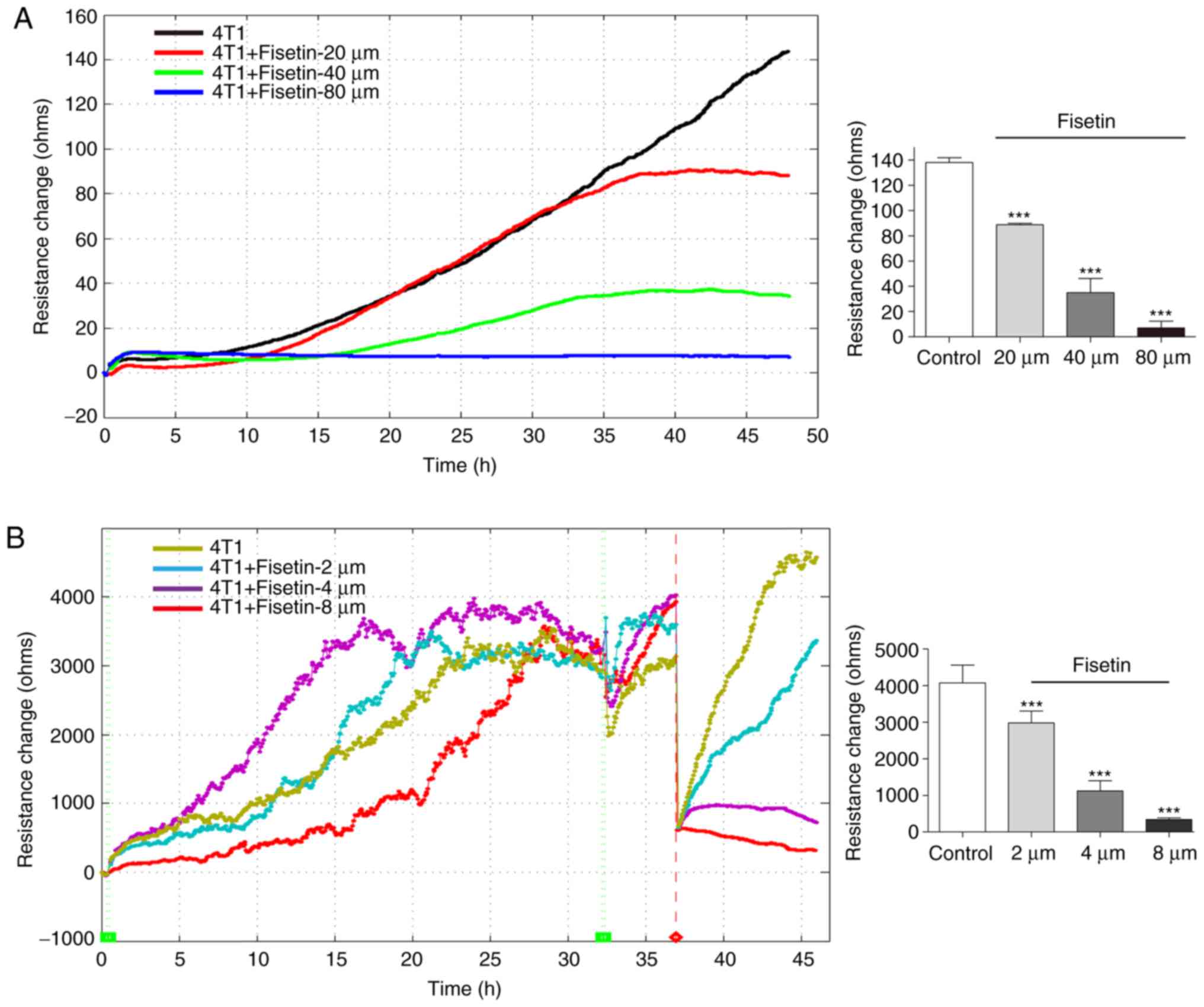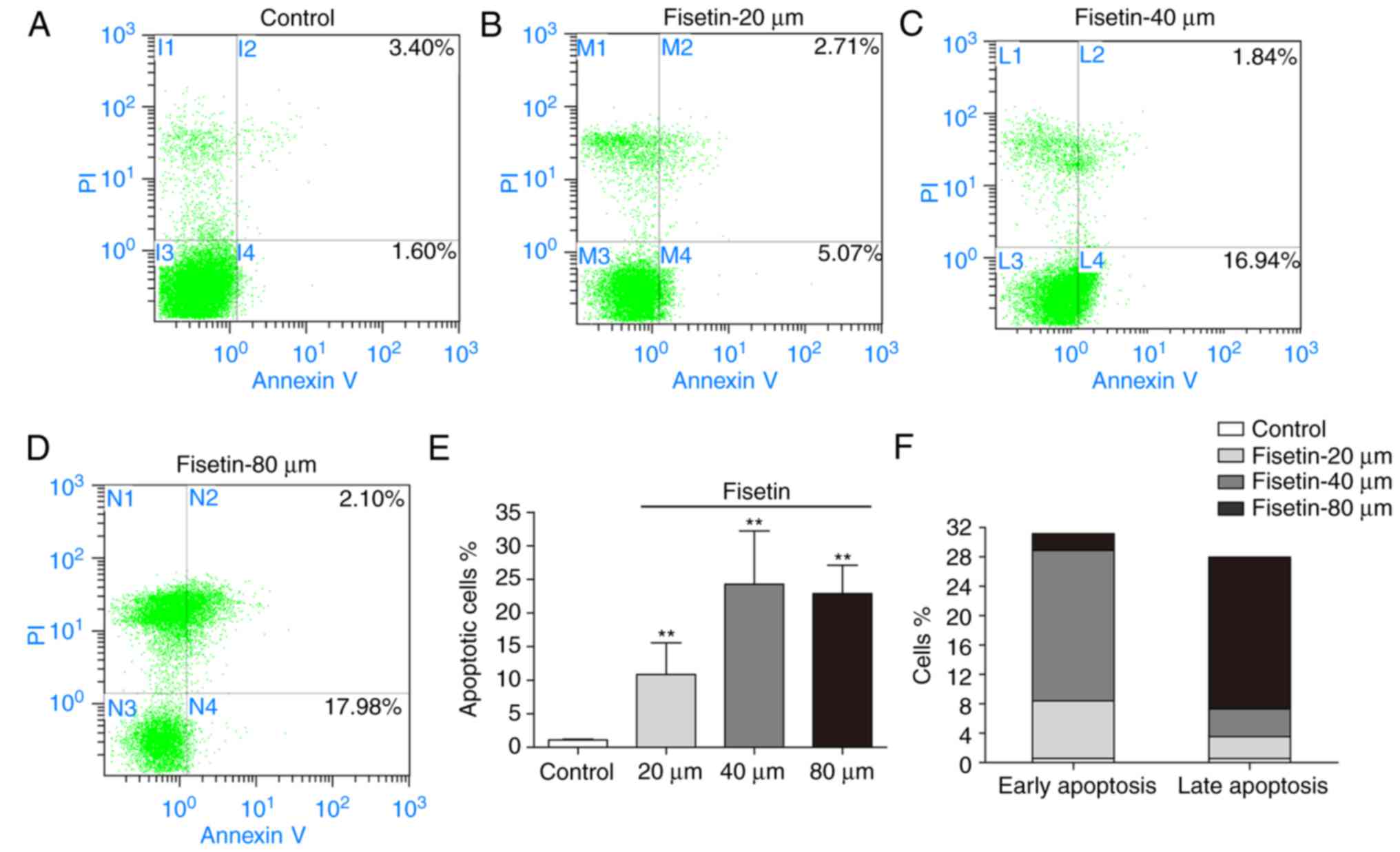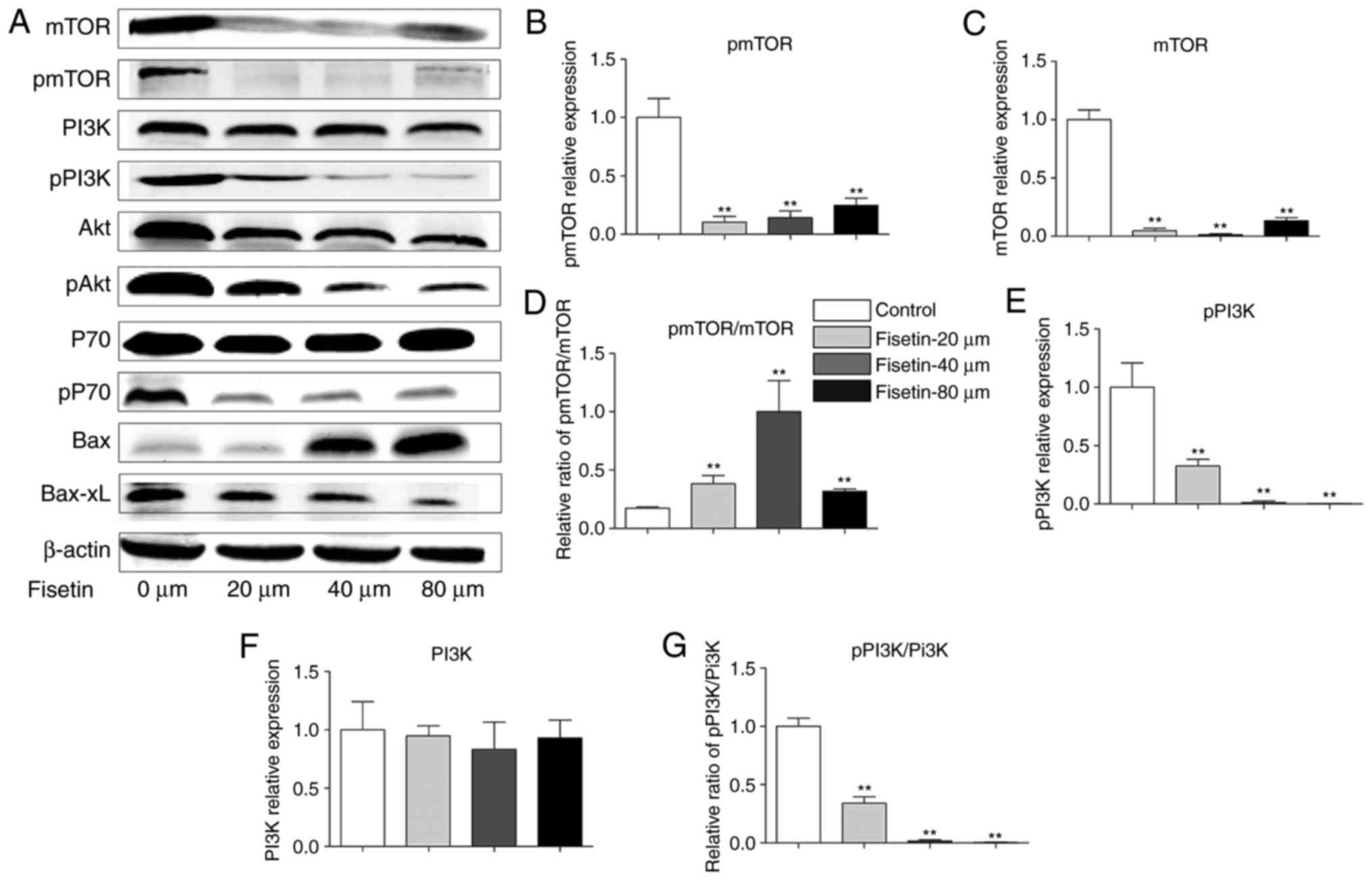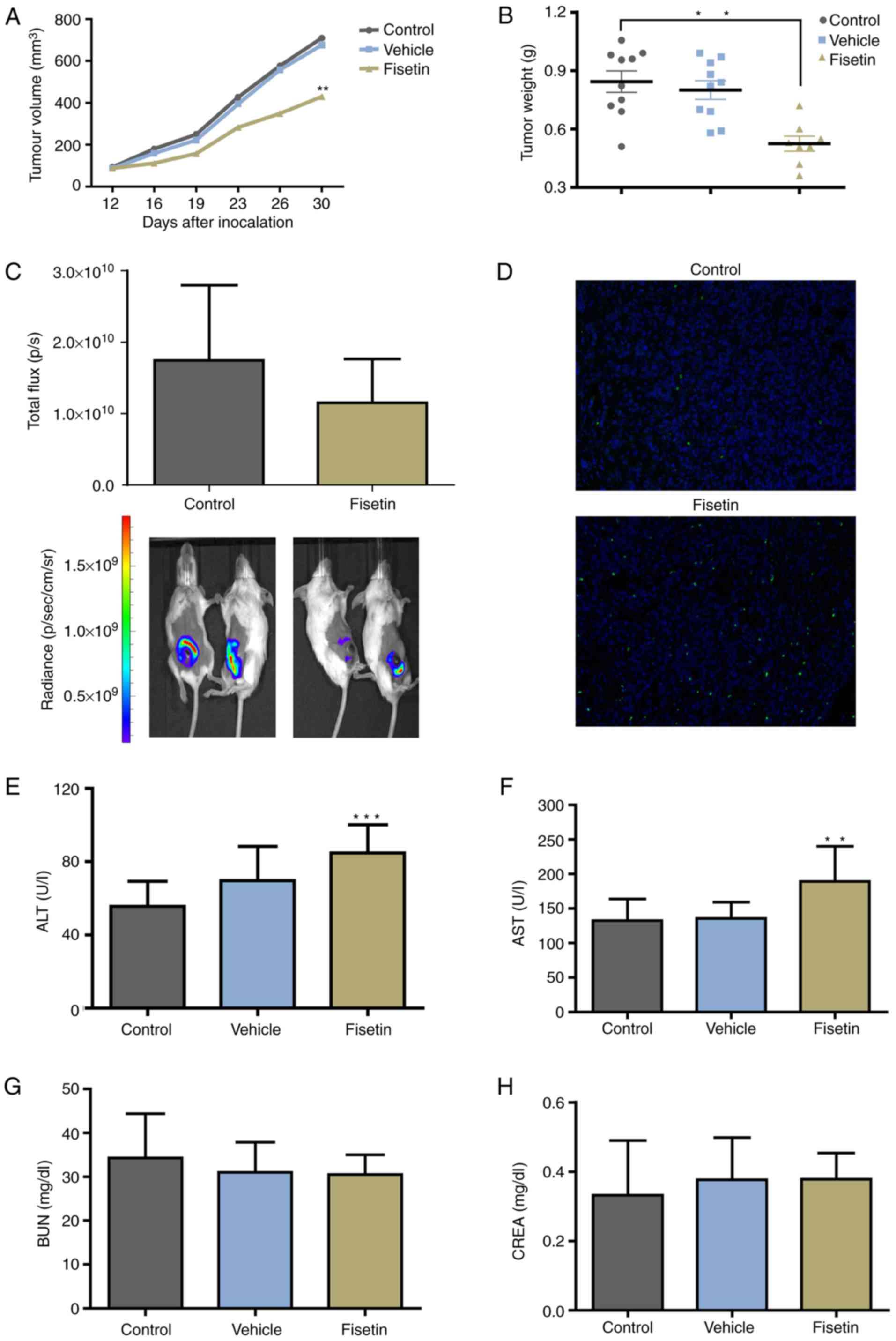|
1
|
Torre LA, Bray F, Siegel RL, Ferlay J,
Lortet-Tieulent J and Jemal A: Global cancer statistics, 2012. CA
Cancer J Clin. 65:87–108. 2015. View Article : Google Scholar : PubMed/NCBI
|
|
2
|
Siegel RL, Miller KD and Jemal A: Cancer
Statistics, 2017. CA Cancer J Clin. 67:7–30. 2017. View Article : Google Scholar : PubMed/NCBI
|
|
3
|
Gemignani ML and Hetzel DJ: Current
advances in endocrine therapy options for premenopausal women with
hormone receptor positive breast cancer. Gynecol Oncol.
147:153–157. 2017. View Article : Google Scholar : PubMed/NCBI
|
|
4
|
Wander SA, Mayer EL and Burstein HJ:
Blocking the cycle: Cyclin-dependent kinase 4/6 inhibitors in
metastatic, hormone receptor-positive breast cancer. J Clin Oncol.
35:2866–2870. 2017. View Article : Google Scholar : PubMed/NCBI
|
|
5
|
Guerrero-Zotano AL and Arteaga CL:
Neoadjuvant trials in ER+ breast cancer: A tool for
acceleration of drug development and discovery. Cancer Discov.
7:561–574. 2017. View Article : Google Scholar : PubMed/NCBI
|
|
6
|
Hu X, Huang W and Fan M: Emerging
therapies for breast cancer. J Hematol Oncol. 10:982017. View Article : Google Scholar : PubMed/NCBI
|
|
7
|
Shachar SS, Jolly TA, Jones E and Muss HB:
Management of triple-negative breast cancer in older patients: How
is it different? Oncology (Williston Park). 32:58–63. 2018.
|
|
8
|
Lee A and Djamgoz MBA: Triple negative
breast cancer: Emerging therapeutic modalities and novel
combination therapies. Cancer Treat Rev. 62:110–122. 2018.
View Article : Google Scholar
|
|
9
|
Wang C, Kar S, Lai X, Cai W, Arfuso F,
Sethi G, Lobie PE, Goh BC, Lim LHK, Hartman M, et al: Triple
negative breast cancer in Asia: An insider's view. Cancer Treat
Rev. 62:29–38. 2018. View Article : Google Scholar
|
|
10
|
Chao J, Dai Y, Verpoorte R, Lam W, Cheng
YC, Pao LH, Zhang W and Chen S: Major achievements of
evidence-based traditional Chinese medicine in treating major
diseases. Biochem Pharmacol. 139:94–104. 2017. View Article : Google Scholar : PubMed/NCBI
|
|
11
|
Goyal S, Gupta N, Chatterjee S and Nimesh
S: Natural plant extracts as potential therapeutic agents for the
treatment of cancer. Curr Top Med Chem. 17:96–106. 2017. View Article : Google Scholar
|
|
12
|
Sun X, Zhang X, Nian JY, Guo J, Yin Y,
Zhang GL, Yu MW, Zhang Y, Wang XM, Yang GW, et al: Chinese herbal
medicine as adjunctive therapy to chemotherapy for breast cancer: A
systematic review and meta-analysis. Evid Based Complement Alternat
Med. 2016:32819682016. View Article : Google Scholar : PubMed/NCBI
|
|
13
|
Khan N, Syed DN, Ahmad N and Mukhtar H:
Fisetin: A dietary antioxidant for health promotion. Antioxid Redox
Signal. 19:151–162. 2013. View Article : Google Scholar :
|
|
14
|
Hodek P, Trefil P and Stiborová M:
Flavonoids-potent and versatile biologically active compounds
interacting with cytochromes 450. Chem Biol Interact. 139:1–21.
2002. View Article : Google Scholar : PubMed/NCBI
|
|
15
|
Jang HS, Kook SH, Son YO, Kim JG, Jeon YM,
Jang YS, Choi KC, Kim J, Han SK, Lee KY, et al: Flavonoids purified
from Rhus verniciflua Stokes actively inhibit cell growth and
induce apoptosis in human osteosarcoma cells. Biochimic Biophys
Acta. 1726:309–316. 2005. View Article : Google Scholar
|
|
16
|
Moon YJ, Wang X and Morris ME: Dietary
flavonoids: Effects on xenobiotic and carcinogen metabolism.
Toxicol In Vitro. 20:187–210. 2006. View Article : Google Scholar
|
|
17
|
Wang G, Wang JJ, Guan R, Du L, Gao J and
Fu XL: Strategies to target glucose metabolism in tumor
microenvironment on cancer by flavonoids. Nutr Cancer. 69:534–554.
2017. View Article : Google Scholar : PubMed/NCBI
|
|
18
|
George VC, Dellaire G and Rupasinghe HPV:
Plant flavonoids in cancer chemoprevention: Role in genome
stability. J Nutr Biochem. 45:1–14. 2017. View Article : Google Scholar
|
|
19
|
Magne Nde CB, Zingue S, Winter E,
Creczynski-Pasa TB, Michel T, Fernandez X, Njamen D and Clyne C:
Flavonoids, breast cancer chemopreventive and/or chemotherapeutic
agents. Curr Med Chem. 22:3434–3446. 2015. View Article : Google Scholar : PubMed/NCBI
|
|
20
|
Zamora-Ros R, Agudo A, Lujan-Barroso L,
Luján-Barroso L, Romieu I, Ferrari P, Knaze V, Bueno-de-Mesquita
HB, Leenders M, Travis RC, et al: Dietary flavonoid and lignan
intake and gastric adenocarcinoma risk in the European Prospective
Investigation into Cancer and Nutrition (EPIC) study. Am J Clin
Nutr. 96:1398–1408. 2012. View Article : Google Scholar : PubMed/NCBI
|
|
21
|
Frankenfeld CL, Cerhan JR, Cozen W, Davis
S, Schenk M, Morton LM, Hartge P and Ward MH: Dietary flavonoid
intake and non-Hodgkin lymphoma risk. Am J Clin Nutr. 87:1439–1445.
2008. View Article : Google Scholar : PubMed/NCBI
|
|
22
|
Syed DN, Adhami VM, Khan MI and Mukhtar H:
Inhibition of Akt/mTOR signaling by the dietary flavonoid fisetin.
Anticancer Agents Med Chem. 13:995–1001. 2013. View Article : Google Scholar : PubMed/NCBI
|
|
23
|
Khan N, Afaq F, Khusro FH, Mustafa Adhami
V, Suh Y and Mukhtar H: Dual inhibition of phosphatidylinositol
3-kinase/Akt and mammalian target of rapamycin signaling in human
nonsmall cell lung cancer cells by a dietary flavonoid fisetin. Int
J Cancer. 130:1695–1705. 2012. View Article : Google Scholar
|
|
24
|
Liao YC, Shih YW, Chao CH, Lee XY and
Chiang TA: Involvement of the ERK signaling pathway in fisetin
reduces invasion and migration in the human lung cancer cell line
A549. J Agric Food Chem. 57:8933–8941. 2009. View Article : Google Scholar : PubMed/NCBI
|
|
25
|
Ravichandran N, Suresh G, Ramesh B and
Siva GV: Fisetin, a novel flavonol attenuates
benzo(a)pyrene-induced lung carcinogenesis in Swiss albino mice.
Food Chem Toxicol. 49:1141–1147. 2011. View Article : Google Scholar : PubMed/NCBI
|
|
26
|
Touil YS, Seguin J, Scherman D and Chabot
GG: Improved antiangiogenic and antitumour activity of the
combination of the natural flavonoid fisetin and cyclophosphamide
in Lewis lung carcinoma-bearing mice. Cancer Chemother Pharmacol.
68:445–455. 2011. View Article : Google Scholar
|
|
27
|
Syed DN, Afaq F, Maddodi N, Johnson JJ,
Sarfaraz S, Ahmad A, Setaluri V and Mukhtar H: Inhibition of human
melanoma cell growth by the dietary flavonoid fisetin is associated
with disruption of Wnt/β-catenin signaling and decreased Mitf
levels. J Invest Dermatol. 131:1291–1299. 2011. View Article : Google Scholar : PubMed/NCBI
|
|
28
|
Murtaza I, Adhami VM, Hafeez BB, Saleem M
and Mukhtar H: Fisetin, a natural flavonoid, targets chemoresistant
human pancreatic cancer AsPC-1 cells through DR3-mediated
inhibition of NF-kappaB. Int J Cancer. 125:2465–2473. 2009.
View Article : Google Scholar : PubMed/NCBI
|
|
29
|
Costa RLB, Han HS and Gradishar WJ:
Targeting the PI3K/AKT/mTOR pathway in triple-negative breast
cancer: A review. Breast Cancer Res Treat. 2018. View Article : Google Scholar : PubMed/NCBI
|
|
30
|
Schettini F, Buono G, Trivedi MV, De
Placido S, Arpino G and Giuliano M: PI3K/mTOR inhibitors in the
treatment of luminal breast cancer. Why, when and to whom? Breast
Care. 12:290–294. 2017. View Article : Google Scholar : PubMed/NCBI
|
|
31
|
Guerrero-Zotano A, Mayer IA and Arteaga
CL: PI3K/AKT/mTOR: Role in breast cancer progression, drug
resistance, and treatment. Cancer Metastasis Rev. 35:515–524. 2016.
View Article : Google Scholar : PubMed/NCBI
|
|
32
|
Arif H, Sohail A, Farhan M, Rehman AA,
Ahmad A and Hadi SM: Flavonoids-induced redox cycling of copper
ions leads to generation of reactive oxygen species: A potential
role in cancer chemoprevention. Int J Biol Macromol. 106:569–578.
2018. View Article : Google Scholar
|
|
33
|
Ghosh P, Singha Roy A, Chaudhury S, Jana
SK, Chaudhury K and Dasgupta S: Preparation of albumin based
nanoparticles for delivery of fisetin and evaluation of its
cytotoxic activity. Int J Biol Macromol. 86:408–417. 2016.
View Article : Google Scholar : PubMed/NCBI
|
|
34
|
Noh EM, Park YJ, Kim JM, Kim MS, Kim HR,
Song HK, Hong OY, So HS, Yang SH, Kim JS, et al: Fisetin regulates
TPA-induced breast cell invasion by suppressing matrix
metalloproteinase-9 activation via the PKC/ROS/MAPK pathways. Eur J
Pharmacol. 764:79–86. 2015. View Article : Google Scholar : PubMed/NCBI
|
|
35
|
Kadari A, Gudem S, Kulhari H, Bhandi MM,
Borkar RM, Kolapalli VR and Sistla R: Enhanced oral bioavailability
and anticancer efficacy of fisetin by encapsulating as inclusion
complex with HPβCD in polymeric nanoparticles. Drug Deliv.
24:224–232. 2017. View Article : Google Scholar : PubMed/NCBI
|
|
36
|
Yang PM, Tseng HH, Peng CW, Chen WS and
Chiu SJ: Dietary flavonoid fisetin targets caspase-3-deficient
human breast cancer MCF-7 cells by induction of
caspase-7-associated apoptosis and inhibition of autophagy. Int J
Oncol. 40:469–478. 2012.
|
|
37
|
Smith ML, Murphy K, Doucette CD,
Greenshields AL and Hoskin DW: The dietary flavonoid fisetin causes
cell cycle arrest, caspase-dependent apoptosis, and enhanced
cytotoxicity of chemotherapeutic drugs in triple-negative breast
cancer cells. J Cell Biochem. 117:1913–1925. 2016. View Article : Google Scholar : PubMed/NCBI
|
|
38
|
Wang L, Zhang DZ and Wang YX: Bioflavonoid
fisetin loaded α-tocopherol-poly(lactic acid)-based polymeric
micelles for enhanced anticancer efficacy in breast cancers. Pharm
Res. 34:453–461. 2017. View Article : Google Scholar
|
|
39
|
Saxena NK, Taliaferro-Smith L, Knight BB,
Merlin D, Anania FA, O'Regan RM and Sharma D: Bidirectional
crosstalk between leptin and insulin-like growth factor-I signaling
promotes invasion and migration of breast cancer cells via
trans-activation of epidermal growth factor receptor. Cancer Res.
68:9712–9722. 2008. View Article : Google Scholar : PubMed/NCBI
|
|
40
|
Saxena NK, Sharma D, Ding X, Lin S, Marra
F, Merlin D and Anania FA: Concomitant activation of the JAK/STAT,
PI3K/AKT, and ERK signaling is involved in leptin-mediated
promotion of invasion and migration of hepatocellular carcinoma
cells. Cancer Res. 67:2497–2507. 2007. View Article : Google Scholar : PubMed/NCBI
|
|
41
|
Zhang Y, Zhang GL, Sun X, Cao KX, Shang
YW, Gong MX, Ma C, Nan N, Li JP, Yu MW, et al: Gubenyiliu II
inhibits breast tumor growth and metastasis associated with
decreased hepa-ranase expression and phosphorylation of erk and akt
pathways. Molecules. 22:E7872017. View Article : Google Scholar
|
|
42
|
Sun JQ, Zhang GL, Zhang Y, Nan N, Sun X,
Yu MW, Wang H, Li JP and Wang XM: Spatholobus suberectus column
extract inhibits estrogen receptor positive breast cancer via
suppressing ER MAPK PI3K/AKT pathway. Evid Based Complement
Alternat Med. 2016:29343402016. View Article : Google Scholar
|
|
43
|
National Research Council (US) Committee:
Guide for the care and use of laboratory animals. 8th. Washington
(DC): 2011
|
|
44
|
Zhang Y, Zhang GL, Sun X, Cao KX, Ma C,
Nan N, Yang GW, Yu MW and Wang XM: Establishment of a murine breast
tumor model by subcutaneous or orthotopic implantation. Oncology
Lett. 15:6233–6240. 2018.
|
|
45
|
Jenkins DE, Oei Y, Hornig YS, Yu SF,
Dusich J, Purchio T and Contag PR: Bioluminescent imaging (BLI) to
improve and refine traditional murine models of tumor growth and
metastasis. Clin Exp Metastasis. 20:733–744. 2003. View Article : Google Scholar
|
|
46
|
Lien EC, Dibble CC and Toker A: PI3K
signaling in cancer: Beyond AKT. Curr Opin Cell Biol. 45:62–71.
2017. View Article : Google Scholar : PubMed/NCBI
|
|
47
|
Rodgers SJ, Ferguson DT, Mitchell CA and
Ooms LM: Regulation of PI3K effector signalling in cancer by the
phosphoinositide phosphatases. Biosci Rep. 37:2017. View Article : Google Scholar : PubMed/NCBI
|
|
48
|
Carvalho S and Schmitt F: Potential role
of PI3K inhibitors in the treatment of breast cancer. Future Oncol.
6:1251–1263. 2010. View Article : Google Scholar : PubMed/NCBI
|
|
49
|
Aleskandarany MA, Rakha EA, Ahmed MA, Powe
DG, Paish EC, Macmillan RD, Ellis IO and Green AR: PIK3C A
expression in invasive breast cancer: A biomarker of poor
prognosis. Breast Cancer Res Treat. 122:45–53. 2010. View Article : Google Scholar
|
|
50
|
López-Knowles E, O'Toole SA, McNeil CM,
Millar EK, Qiu MR, Crea P, Daly RJ, Musgrove EA and Sutherland RL:
PI3K pathway activation in breast cancer is associated with the
basal-like phenotype and cancer-specific mortality. Int J Cancer.
126:1121–1131. 2010. View Article : Google Scholar
|
|
51
|
Rychahou PG, Jackson LN, Silva SR,
Rajaraman S and Evers BM: Targeted molecular therapy of the PI3K
pathway: Therapeutic significance of PI3K subunit targeting in
colorectal carcinoma. Ann Surg. 243:833–842. 2006. View Article : Google Scholar : PubMed/NCBI
|
|
52
|
Seguin J, Brullé L, Boyer R, Lu YM, Ramos
Romano M, Touil YS, Scherman D, Bessodes M, Mignet N and Chabot GG:
Liposomal encapsulation of the natural flavonoid fisetin improves
bioavailability and antitumor efficacy. Int J Pharm. 444:146–154.
2013. View Article : Google Scholar : PubMed/NCBI
|



















